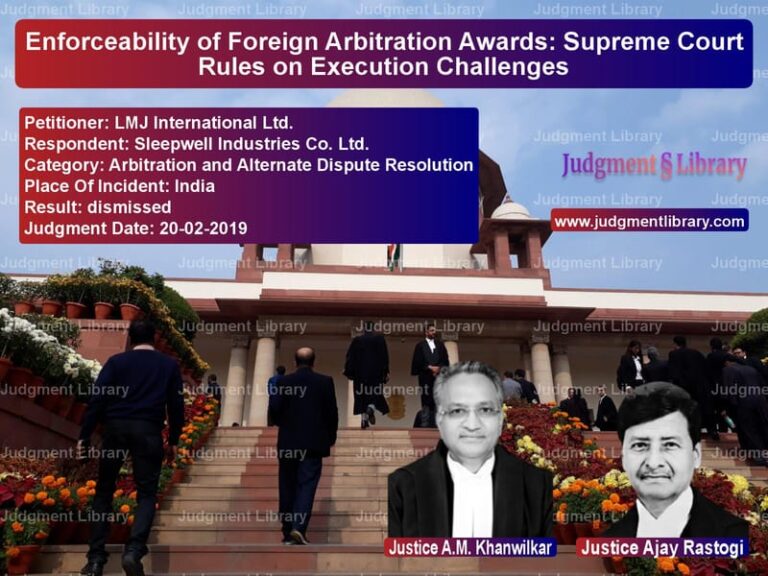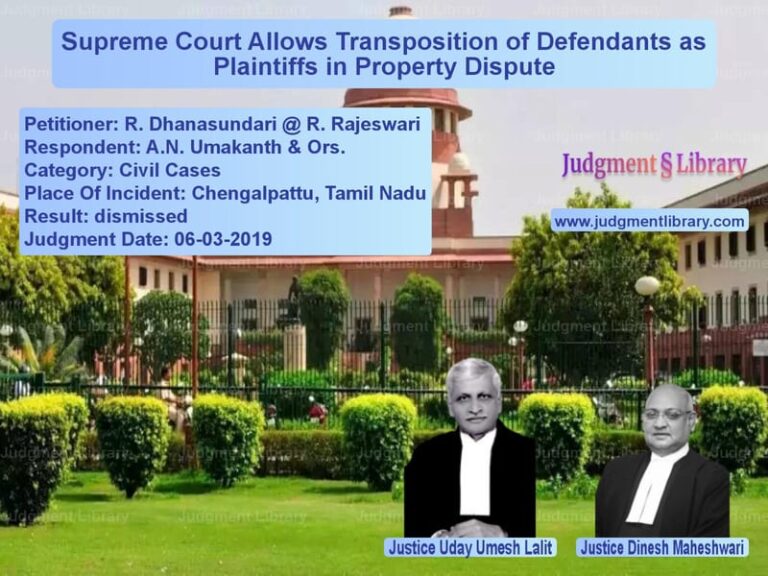Supreme Court Rules on Pre-Deposit Requirement in Debt Recovery Case Involving Kotak Mahindra Bank
The Supreme Court of India recently delivered a significant judgment in the case of Kotak Mahindra Bank Pvt. Limited vs. Ambuj A. Kasliwal & Others, addressing the pre-deposit requirement under the Recovery of Debts and Bankruptcy Act, 1993 (RDBA). The Court set aside the Delhi High Court’s order, which had exempted the respondents from making a pre-deposit before appealing to the Debts Recovery Appellate Tribunal (DRAT).
A bench comprising Chief Justice S.A. Bobde, Justice A.S. Bopanna, and Justice V. Ramasubramanian ruled that the respondents must deposit at least 25% of the debt amount to pursue their appeal. This judgment reinforces the principle that statutory pre-deposit requirements must be adhered to in debt recovery proceedings.
Background of the Case
Loan Default and Debt Recovery Proceedings
The case originated from a financial dispute where Hindon River Mills Ltd. (respondent no. 3) availed a loan from IFCI Ltd. (respondent no. 6), with respondents no. 1 and 2 acting as guarantors. Due to non-repayment, the account was classified as a non-performing asset (NPA) and was subsequently auctioned, with Kotak Mahindra Bank emerging as the successful bidder.
Following this, Kotak Mahindra Bank initiated recovery proceedings before the Debts Recovery Tribunal (DRT), which issued a recovery certificate against respondents no. 1 to 3 for Rs. 145 crores with 9% interest per annum.
Pre-Deposit Requirement and High Court Intervention
As per Section 21 of the RDBA, any appeal to the Debts Recovery Appellate Tribunal (DRAT) requires a mandatory pre-deposit of 50% of the determined debt. However, DRAT, considering the amount already recovered by the bank, directed a pre-deposit of only 50% of the remaining debt.
Unhappy with this decision, respondents no. 1 and 2 approached the Delhi High Court, which entirely waived the pre-deposit requirement, allowing them to appeal without any initial deposit.
Supreme Court’s Observations and Ruling
Legality of Pre-Deposit Waiver
The Supreme Court examined the statutory framework governing pre-deposit requirements and held that courts cannot override statutory mandates. The judgment stated:
“The High Court has no power to waive the pre-deposit requirement in its entirety, as doing so would contravene the statutory provisions under Section 21 of the Recovery of Debts and Bankruptcy Act, 1993.”
Interpretation of Section 21 of RDBA
The Court clarified that while DRAT has limited discretion to reduce the pre-deposit amount, it cannot waive it entirely. The judgment explained:
“Section 21 allows for a reduction in the pre-deposit amount, but the minimum deposit cannot be less than 25% of the debt due.”
Balance of Debt After Recoveries
Respondents argued that Kotak Mahindra Bank had already received Rs. 152.81 crores through compensation, thus settling the debt. However, the Supreme Court ruled that the pre-deposit requirement is calculated based on the remaining debt due:
“Even after adjusting the compensation amount, the outstanding balance was Rs. 68.18 crores, and DRAT was correct in directing a pre-deposit of 50% of this amount.”
Final Judgment
- The Supreme Court set aside the Delhi High Court’s order.
- The Court ruled that respondents no. 1 and 2 must deposit at least 25% of Rs. 68.18 crores to proceed with their appeal before DRAT.
- The Court clarified that DRAT’s decision to require a pre-deposit was in accordance with statutory provisions.
Key Takeaways from the Judgment
- Pre-deposit requirements in debt recovery appeals are mandatory.
- Courts cannot waive pre-deposits entirely but can reduce them to a minimum of 25%.
- Outstanding debt calculation must consider past recoveries, but it does not eliminate the pre-deposit requirement.
- Judicial discretion must align with statutory limitations under Section 21 of the RDBA.
Impact of the Judgment
This ruling ensures that banks and financial institutions can recover debts efficiently without unnecessary delays in appellate proceedings. It upholds the legal requirement of pre-deposit, preventing frivolous appeals while allowing genuine appellants an opportunity to contest their cases.
Conclusion
The Supreme Court’s decision in Kotak Mahindra Bank Pvt. Limited vs. Ambuj A. Kasliwal & Others reinforces the importance of statutory compliance in debt recovery cases. By setting aside the High Court’s order, the judgment ensures that financial institutions can recover dues effectively, while debtors seeking appeal must comply with mandatory pre-deposit conditions.
Petitioner Name: Kotak Mahindra Bank Pvt. Limited.Respondent Name: Ambuj A. Kasliwal & Others.Judgment By: Justice S.A. Bobde, Justice A.S. Bopanna, Justice V. Ramasubramanian.Place Of Incident: New Delhi, India.Judgment Date: 16-02-2021.
Don’t miss out on the full details! Download the complete judgment in PDF format below and gain valuable insights instantly!
Download Judgment: kotak-mahindra-bank-vs-ambuj-a.-kasliwal-&-supreme-court-of-india-judgment-dated-16-02-2021.pdf
Directly Download Judgment: Directly download this Judgment
See all petitions in Debt Recovery
See all petitions in Banking Regulations
See all petitions in Judgment by S. A. Bobde
See all petitions in Judgment by A. S. Bopanna
See all petitions in Judgment by V. Ramasubramanian
See all petitions in allowed
See all petitions in Modified
See all petitions in supreme court of India judgments February 2021
See all petitions in 2021 judgments
See all posts in Civil Cases Category
See all allowed petitions in Civil Cases Category
See all Dismissed petitions in Civil Cases Category
See all partially allowed petitions in Civil Cases Category







